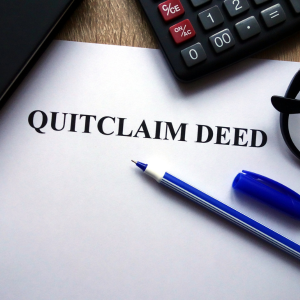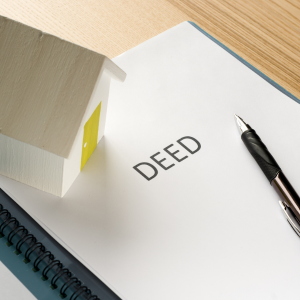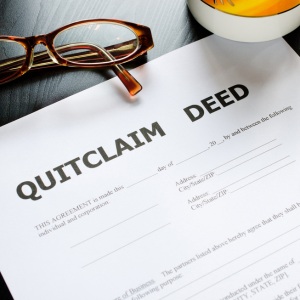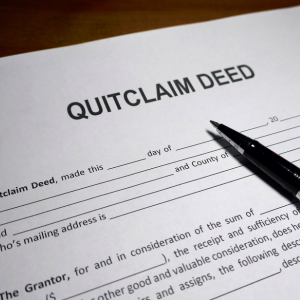
Legal Considerations for Quitclaim Deeds in Texas
What Are the Legal Implications of Using a Quitclaim Deed?
Some people can sell their share of a property without having to show that the title is real. The name for this is a quitclaim deed. People who trust each other a lot do this kind of thing. But here are some important things to keep in mind about Texas:
- Risk: The main risk of a quitclaim deed is that it doesn’t protect you if there are other claims or liens on the property that you aren’t aware of. People who buy something only get what the seller has, which could be nothing if the title isn’t clear.
- Texas Quitclaim Laws: In Texas, you can use a quitclaim deed, but it might not protect buyers as well as other types of deeds. This kind of deed doesn’t have a clear title.
- Property Transfer and Conveyance: To transfer and move property, you need to make sure you have the right paperwork when you use a quitclaim deed, as it only covers the interest that was agreed upon when the deed was signed. Things can go wrong if you don’t have the right paperwork.
How Are Quitclaim Deeds Governed by Texas Law?

The following laws and rules govern quitclaim deeds in Texas:
- Texas Government Code: The Texas Government Code tells people what their property rights are and how they should give up their property. It shows you what a quitclaim deed should look like and how to use it.
- Real Estate Law and Statute: In order for quitclaim deeds to be valid under Texas real estate law, they must follow certain statutes. This kind of deed doesn’t come with a warranty like warranty deeds do, so folks who buy it are less safe.
- Legal Framework and Property Rights: The laws that govern quitclaim deeds can help both buyers and sellers understand the terms of a deal better. People can follow these laws if they know what to do.
When Is Legal Advice Necessary for Quitclaim Deeds?
Talk to a lawyer first when you deal with quitclaim deeds in Texas because real estate deals there are risky:
- Consult an Attorney: Hiring a real estate lawyer, like those in Dallas, can be very helpful when you’re moving. Lawyers can help lower the risks that come with having trouble with the title.
- Legal Assistance for Property Transactions: Hiring a lawyer makes sure that all of the steps in the quitclaim deed process are done correctly. This lowers the chance of having legal issues or disputes in the future.
- Guidance for Texas Real Estate Transactions: It’s best to talk to an experienced lawyer because the laws are so complicated. The tips in this article are meant to help you and make sure you follow the law.
We Buy Houses For Cash Dallas is here for you if you need help or want to know more about quitclaim deeds. We can help you with everything you need in terms of real estate. Please write about your ideas or experiences in the box below. What you say is important to us!
Common Misconceptions About Quitclaim Deeds
Are Quitclaim Deeds Always the Best Option?
In real estate, a quitclaim deed is often used to transfer property interests quickly without any warranty. This doesn’t mean it’s always the best way to move a house, though. It can be useful for transferring property to family members or resolving ownership issues. But if you’re selling a house in Texas and transferring property, it might not protect you as well as a warranty deed. When there are a lot of moving parts, like in the Dallas real estate market, it’s important that everyone knows what the rules are. When making these kinds of deals, it’s smart to talk to professionals first.
What Are the Potential Risks Involved?

Quitclaim deeds carry certain risks, mainly because they don’t guarantee the property’s title status. Here are some bad things about it:
- Lack of Warranties: There are no guarantees with quitclaim deeds, unlike warranty deeds. They only say that the grantor has a clear title to the property.
- Document Errors: Legal documents that have mistakes can cause arguments or transfers that aren’t valid.
- Limited Buyer Protection: Buyers don’t have many legal options if problems with the title show up after the transfer.
Because of these risks, you should talk to a Dallas real estate lawyer before you use a quitclaim deed to move property. Know the risks, especially if you’re a buyer who wants to make sure your money is safe.
Can Quitclaim Deeds Be Easily Overturned or Challenged?
One worry about quitclaim deeds is that they could be contested in court. They don’t promise a clear title, so property rights disputes can happen. This could lead to expensive court battles. Having a lawyer is helpful in Dallas because there are a lot of foreclosures and fights over who owns things. Making the terms and conditions clear can help keep the deed from being contested.
If you know a lot about the law and have good help, you can use a quitclaim deed well. Talking to a lawyer makes sure that all of your legal options are considered and protects you from future disputes. If you want to know more, please contact us at We Buy Houses For Cash Dallas. We can help you in a way that works for you.
How to Prepare a Quitclaim Deed for Your Dallas Property
What Information Is Required to Complete a Quitclaim Deed?
Get all the information you need to make a quitclaim deed valid before you start writing one for your Dallas property. What you need is this:
- Names of Grantor(s) and Grantee(s): Write down the full legal names of everyone who has a stake in the quitclaim. The person who is giving up their interest is called the grantor, and the person who is receiving it is called the grantee.
- Property Description: Give a full description of the Dallas property that matches the legal description on the current deed.
- Consideration: Though quitclaim deeds don’t usually involve money, it’s still a good idea to write down anything of value that was traded.
- Signatures: The grantor must sign the document, and in Texas real estate deals, a notary public must make sure the signature is correct.
- Notary Acknowledgment: To make sure the document is legal, a notary must be present when it is signed.
This information is useful if you want to sell your house or change who owns the property.
How Do You Properly File a Quitclaim Deed in Dallas?

To make sure the legal document transfer is valid, there are several steps to file a quitclaim deed in Dallas:
- Complete the Deed: Give the quitclaim deed all the information it needs.
- Notarization: Have a public notary sign the document in front of you. This step makes sure that the document is real.
- File with the County Clerk: You can bring or mail the notarized deed to the Dallas County Clerk’s office.
- Pay the Filing Fee: The deed needs to be filed for a fee. Find out the exact amount from the county clerk.
- Consult a Real Estate Lawyer: To make sure the process goes smoothly and legally, it’s a good idea to talk to a real estate lawyer in Dallas.
Following these steps will help you properly transfer property ownership in Texas.
Who Needs to Be Involved in the Preparation and Filing?
When making and filing a quitclaim deed, the following people must be present:
- Grantor and Grantee: The people who give and receive property rights are called the grantor and grantee. Both need to know what their jobs are.
- Notary Public: This person makes sure that the signatures on the deed are real.
- Attorney: Talking to a Dallas real estate lawyer about your legal issues can help you stay out of trouble with the law.
- Title Company: You don’t always need a title company, but if you do, they can make sure the transfer of the title goes smoothly and there are no liens or other difficulties.
- County Clerk: The official filing of deeds takes place in the clerk’s office.
Having these important people involved helps make sure the deed transfer goes smoothly. If you need more help with your real estate deals, you might want to talk to experts in Dallas.
The Role of Notarization in Quitclaim Deeds
Why Is Notarization Important for Quitclaim Deeds?
The act of notarizing a quitclaim deed is a key part of making it legal. A notary is a third party who watches the signing and confirms who is signing. This helps stop fraud and makes sure that legal documents are sent correctly.
The risks of transferring property are lower when a quitclaim deed is notarized. It adds security by making sure that everyone agrees to the terms. Notarization isn’t needed in all states, but it’s a good idea for real estate deals.
Talking to a lawyer about the law can also be helpful. They can make sure everything is done right and talk about the risks of quitclaim deeds.
How Does One Find a Notary for a Quitclaim Deed in Dallas?

It’s easy to find a notary in Dallas for a quitclaim deed. These are some ways:
- Visit Local Banks or Credit Unions: Go to a local bank or credit union. A lot of them offer free notary services.
- Contact a Real Estate Lawyer in Dallas: Contact a Dallas real estate lawyer. Most of the time, they can help with property issues and notarization.
- Use Notary Directories Online: Use online directories of notaries. For example, the American Association of Notaries has a list of certified notaries in Texas.
- Check with Local Attorneys: Talk to lawyers in your area. As part of their job, many lawyers offer notary services.
Hiring a Dallas real estate lawyer can speed up the process and make sure the paperwork is done right.
What Steps Are Involved in the Notarization Process?
For a quitclaim deed to be notarized, do the following:
- Preparation: Get all of the necessary paperwork and IDs ready for the event.
- Presence: Everyone signs in front of the notary to show their IDs and give their permission.
- Document Review: The notary makes sure that everything is ready to be signed.
- Authorization: The notary will add their seal and signature to the deed after you sign it in front of them.
- Record Keeping: The notary writes down the details so they can be used again in the future.
You can avoid making mistakes that could affect the property’s title by having an attorney walk you through this process.
We Buy Houses For Cash Dallas can help you with quitclaim deeds or answer any questions you have about them. We can help you with everything you need in terms of real estate. Feel free to ask us questions or get help from professionals.
Alternatives to Quitclaim Deeds
What Are Other Methods of Transferring Property in Texas?
Before you use the quitclaim deed to transfer property in Texas, you should know about the other options. There are times and places when each way is useful.

- Warranty Deed: This is a common way to sell or give away property in Texas. Buyers are well protected by the law because it shows the seller has a clear title to the property and the right to sell it. There are two kinds: a general warranty deed protects you in many ways, and a special warranty deed only protects you while the seller owns the property.
- Deed of Trust: This is used when financing is needed for a real estate deal. There are three people involved: the borrower, the lender, and a trustee. The trustee holds the title to the property until the loan is paid off. This is done to protect the loan.
- Life Estate: This way, a person can give their property to someone else but still have the right to live there forever. It’s used a lot when planning an estate.
- Probate and Heirship: When someone dies and leaves behind property, it usually goes through probate, which is the legal process for distributing their assets. If formal probate is not needed, an heirship affidavit can be used.
Finding out about these options can make the process of selling a house in Texas go more smoothly. You can find the right information by reading the Texas government code or talking to a Dallas real estate lawyer.
How Does a Warranty Deed Compare to a Quitclaim Deed?
This is what you need to know about the main differences between a warranty deed and a quitclaim deed in Texas.
When a buyer buys something, a warranty deed gives the buyer full guarantees from the seller. It says that the seller legally owns the property and will take care of any claims made against the title in the future. This is best for buyers who want to feel safe and know more about the property’s history.
On the other hand, a quitclaim deed gives away any rights the seller has without making any promises about the title. This works well for family transfers of property or low-risk situations.
There is also a special warranty deed in the middle. It only makes sure the title is valid while the seller owns the property. Talking to a real estate lawyer in Dallas can help you if you don’t understand Texas quitclaim laws or which document to use.
Are There Situations Where Another Method Is More Appropriate?
The best way to buy or sell a house depends on the specifics of the deal. There are times when something other than a quitclaim deed might work better:

- Complex Estates: If there are a lot of heirs and the estate is complicated, probate may be needed to make sure that the property deeds are transferred legally and clearly.
- Mortgage Involvements: If there is a mortgage, a deed of trust may be needed to protect the lender’s interests.
- Seller Financing: When the seller finances the sale, paperwork should protect the seller. For example, a warranty deed or deed of trust could be used.
- Granting Easements: There are specific legal rules that must be followed when giving away some rights, like an easement. A quitclaim deed may not be enough.
- Legal Advice and Real Estate Law: If you don’t know much about Texas real estate law, it’s a good idea to talk to an attorney or get professional legal advice.
Choosing the right way to transfer property protects your rights and gives you peace of mind. Whether you’re dealing with an estate, a mortgage, or seller financing, making the right choice can make your real estate deals easier and protect your interests.
We Buy Houses For Cash Dallas can help you with your Texas real estate transactions if you have questions or need more help. They offer expert advice and services that are tailored to your needs. We’d love to hear your thoughts, and we look forward to helping you with your real estate needs.
FAQs:
What is a quitclaim deed, and how is it used in selling a house?
A quitclaim deed is a legal document that transfers ownership of real estate without guaranteeing a clear title. It’s often used among family members or during divorces. In Dallas, sellers can use it to transfer interest quickly but should consult a real estate attorney to understand legal implications.
Can I sell my house quickly in Texas with a quitclaim deed?
Yes, you can sell your house quickly in Texas using a quitclaim deed, especially if time is critical. However, since it doesn’t guarantee a clear title, buyers might be wary. Consulting a professional can offer guidance for a smooth transaction.
How does a quitclaim deed differ from a general warranty deed?
A quitclaim deed transfers a person’s interest in a property without guarantees. A general warranty deed provides assurances against any claims on the property’s title. This is important to know, especially if considering seller financing or dealing with heirs or beneficiaries.
What should I know about the right of survivorship when transferring property?
Right of survivorship ensures that when a property owner dies, their share automatically goes to the surviving owners. It’s often tied to joint tenancy and can be detailed in deeds like ladybird deeds. Legal advice can help determine its suitability for your situation.
What is a deed in lieu of foreclosure, and how might it affect me?
A deed in lieu of foreclosure lets homeowners avoid foreclosure by transferring the property title to the lender. This option might help you avoid the legal and financial consequences of foreclosure. Legal fees and attorney guidance are crucial here.
How do restrictive covenants impact my ability to sell property with a quitclaim deed?
Restrictive covenants may limit how a property is used, affecting the sale. You might need to address these issues before using a quitclaim deed. An attorney can provide clarity and ensure compliance with guidelines.
Are there risks involved in selling property “as is” with a quitclaim deed?
Selling “as is” with a quitclaim deed means the buyer accepts the property condition and any title issues. Although this process can be quick, you must disclose known problems to prevent future disputes. A real estate lawyer can offer legal protection advice.
Who should not use a quitclaim deed to sell their property?
If the property has liens, complex shared ownership, or needs clear title assurance, a special or general warranty deed might be better. Professional guidance helps determine the best deed type for your needs and circumstances.
Key Insights
- A quitclaim deed lets you sell your house without a warranty, often used in marital arrangements or when dividing property among heirs. It’s wise to consult a lawyer to ensure compliance with Texas regulations.
- Understand the complexities of transferring property with a quitclaim deed. This format is popular for simple transactions among family members or trusted parties.
- Get legal assistance from attorneys specializing in real estate to guide you through the deed transfer process and ensure adherence to laws like the Uniform Commercial Code.
- Know the difference between special warranty deeds and quitclaim deeds, mainly in terms of protection levels. Consider their specific conditions and benefits before choosing.
- To sell your house successfully, prepare thoroughly and understand legal terms such as lien, power of attorney, and the role of a trustee.
- Effective marketing involves clear terms and conditions, with potential support from firms skilled in handling estates and legal transfers.
- Make sure documents are notarized and accepted by all parties, especially when transferring real estate in Austin or Dallas, TX.
- Be aware of the potential risks and benefits of quitclaim deeds to make informed decisions about your estate property.
- When dealing with shared ownership or transferring property to a beneficiary, a good understanding of procedures and state guidelines ensures a smooth transition.
- For questions about selling your property with a quitclaim deed, contact us for expert guidance and personalized support throughout the process.
Read on to learn how to sell a house in Texas. The tips and guidelines are applicable statewide, including cities like Dallas, El Paso, Houston, Austin, San Antonio, Fort Worth, and nearby regions. For personalized assistance, Contact Us at (469) 765-3669.


